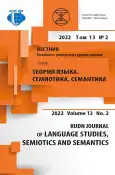Cognitive-Pagmatic Characteristics of Fiction Text on the Material of D.N. Mamin-Sibiryak’s Short Story “Emelya the Hunter”
- Autores: Semenova S.N.1
-
Afiliações:
- Kuban State University
- Edição: Volume 13, Nº 2 (2022)
- Páginas: 280-293
- Seção: SEMIOTIC AND POETIC TEXT STUDIES
- URL: https://journal-vniispk.ru/2313-2299/article/view/323496
- DOI: https://doi.org/10.22363/2313-2299-2022-13-2-280-293
- ID: 323496
Citar
Texto integral
Resumo
The researcher attempts to give the cognitive and pragmatic characteristics of fiction text (based on D.N. Mamin-Sibiryak’s short story “Emelya the Hunter”). The aim of the work was to build the model of the cognitive type on D.N. Mamin-Sibiryak’s short story and analyze speech realizations in the text. The novelty of this article is a detailed cognitive and pragmatic study of the constituent elements, a description of the mental and linguistic structure (cogniotype) and the interpretation of the received results in the studying process of the structural and content side of the text of the short story “Emelya the Hunter”. The material for the study and analysis in this research was not only the theoretical and practical positions of the scientific works of a number of Russian linguists studying the understanding of any text of various genres of fiction works, but also the linguistic material itself: the short story of D.N. Mamin-Sibiryak “Emelya the Hunter” in Russian. To achieve the aim of the research the following tasks were solved: 1) to build the structure of the cognitive type of the short story “Emelya the Hunter”; 2) to find the terms related to various scientific disciplines; 3) to find phraseological units; 4) to systematize adjectives; 5) to give a cognitive and pragmatic description of the studied text. The author of the present article used such methods as: 1) continuous sampling of vocabulary; 2) classification; 3) quantitative calculation; 4) interpretive. D.N. Mamin-Sibiryak’s short story “Emelya the Hunter” was studied from various positions. A model of the cognitive type of D.N. Mamin-Sibiryak’s short story “Emelya the Hunter” was shown in the form of a structure with main topics and their interrelationships. As a result, scientific terms in Geography and Biology were identified and systematized; phraseological units were found and comments were given to them; adjectives were found and classified by types and systematized in the table; the quantitative and percentage ratios of adjectives were calculated and presented in the table and diagrams. The results of the study showed that phraseological units reflected the people’s value priorities in a certain metaphorical form. The relevance of the research was determined by the importance of the chosen topic and its theoretical and practical significance for the cognitive direction in scientific research.
Palavras-chave
Sobre autores
Sofiya Semenova
Kuban State University
Autor responsável pela correspondência
Email: sofiya.semenova75@yandex.ru
Código SPIN: 6833-6538
candidate of Philology, Associate Professor of English in professional sphere department of Roman-German Philology Faculty Stavropolskaya st., 149, Krasnodar, Russian Federation, 350040
Bibliografia
- Zyryanov, O.V. (2012). Mamin-Sibiryak’s literary legacy and prospects of regional literary studies. Philological class, 4 (30), 7–15. (In Russ.).
- Zhitkova, L.N. (2012). History and historicism in Mamin-Sibiryak’s literary works. Philological class, 4 (30), 23–25. (In Russ.).
- Baranov, A.G (2013). Cognitivism in use. Cognitive Studies of Language, 14, 268–272. (In Russ.).
- Semenova, S.N. (2018). Structure of cognitive type of scientific article on mountain ecosystems. RUDN Journal of Language Studies, Semiotics and Semantics, 9 (2), 302–319. https://doi.org/10.22363/2313-2299-2018-9-2-302-319
- Inyutina, L.A. (2010). Spatial lexical paradigms in Siberian folklore texts of the 17th — 18th centuries. Word: Folklore-dialectological almanac, 8, 43–51. (In Russ.).
- Tikhomirov, S.A. (2009). “Real world” text modeling (based on hyperbolic meaning of adjectives). Problems of History, Philology, Culture, 4 (26), 123–128. (In Russ.).
- Kharchenko, S.Yu. (2014). Nuclear and peripheral LSGs of adjectives in the lexicon of dialect speakers (based on the speech of residents living in settlements with mixed population). Science Journal of Volgograd State University. Linguistics, 4 (23), 37–45. (In Russ.).
- Semenova, S.N. (2015). Implicity of indirect utterances (on material of American and English authors’ fiction texts). Proceedings of Southern Federal University. Philology, 4, 140–144. https://doi.org/10.18522/1995-0640-2015-140-144 (In Russ.).
- Novikov, L.A. (2001). Selected works. Aesthetic aspects of the language. Miscellanea. Moscow: RUDN Publ. (In Russ.).
- Bierich, A., Lomakina, O.V., Nikolaeva, E.K. et al. (2020). Counterpoints of Modern Phraseology. To the Anniversary of Prof. V.M. Mokienko. RUDN Journal of Language Studies, Semiotics and Semantics, 11(3), 425–433. https://doi.org/10.22363/2313-2299-202011-3-425-433 (In Russ.).
- Nikitina, T.G. (2020). Professor Valery Mokienko: “I have a lot of things to do, but only one Pole Star” (dedicated to the anniversary of the scientist). Russian Language Studies, 18(2), 141–151. https://doi.org/10.22363/2618-8163-2020-18-2-141-151 (In Russ.).
- Ivanov, E.E., Lomakina, O.V. & Petrushevskaya, Ju.A. (2021). The National Specificity of the Proverbial Fund: Basic Concepts and Procedure for Determining. RUDN Journal of Language Studies, Semiotics and Semantics, 12(4), 996–1035. https://doi.org/10.22363/2313-22992021-12-4-996-1035 (In Russ.).
- Seliverstova, E.I. (2020). Levels of Manifestation of Typological Similarity in Proverbs of Different Languages. RUDN Journal of Language Studies, Semiotics and Semantics, 11(2), 198–212. https://doi.org/10.22363/2313-2299-2020-11-2-198-212 (In Russ.).
- Podyukov, I.A. (2020). Peculiarities of the Phraseological Content of Perm Old Believer Dialects. RUDN Journal of Language Studies, Semiotics and Semantics, 11(2), 285–300. https://doi.org/10.22363/2313-2299-2020-11-2-285-300 (In Russ.).
- Osokina, E.A. (2021). Some Aspects of Author’s Phraseology of F.M. Dostoevsky // RUDN Journal of Language Studies, Semiotics and Semantics. 12(2), 417–435. https://doi. org/10.22363/2313-2299-2021-12-2-417-435 (In Russ.).
- Nikitina, T.G. (2020). Structural-Semantic Modeling in Phraseology: Forty Years of Experience and the Prospects. RUDN Journal of Language Studies, Semiotics and Semantics, 11(2), 175–197. https://doi.org/10.22363/2313-2299-2020-11-2-175-197 (In Russ.).
- Mamin-Sibiryak, D.N. (1969). Emelya the Hunter. In: Winter on the Studennaya. Moscow: Detskaya literatura publ. pp. 36–47. (In Russ.).
Arquivos suplementares









